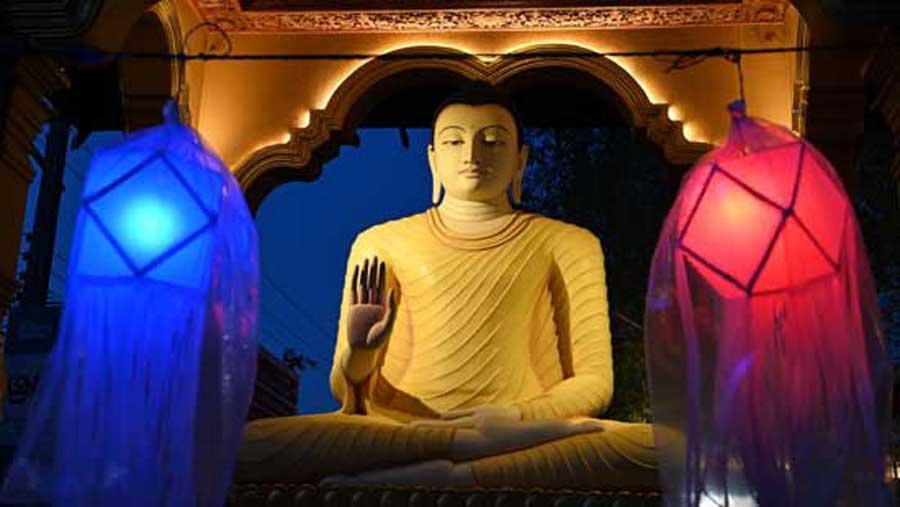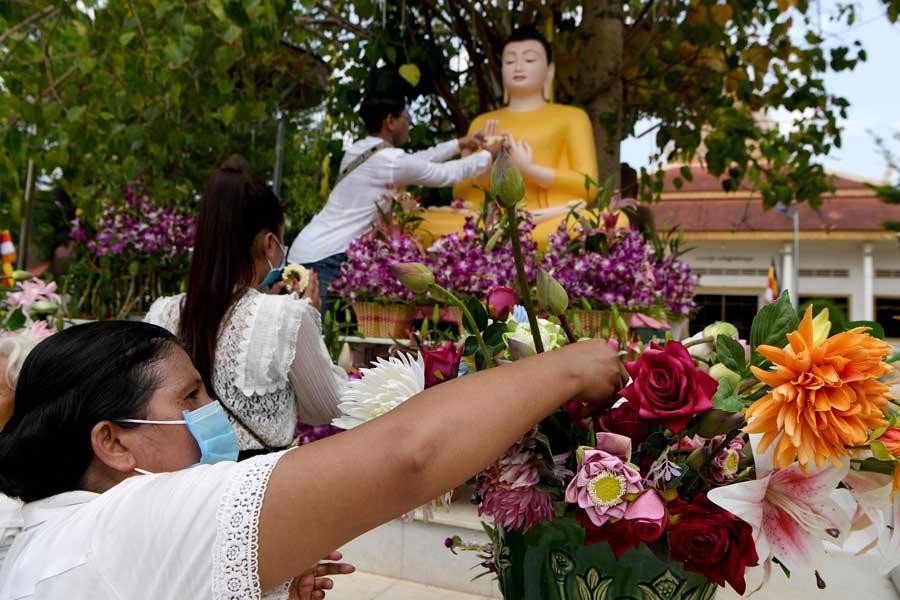08 May 2020 - {{hitsCtrl.values.hits}}

Answer to trials, tribulations and epidemics
Dhamma is a very simple process which is taking place universally and at every moment in every being. Any person can comprehend this Dhamma as soon as it is uncovered of the cloaks of mystery called …isms in which it was surrounded by attitude, thinking and way of life. 
In times of pretence and falsehood greed and hatred rule the roost. Digital miracles and technological progress galore on one side, while lack of regard for life spoils everyone’s hopes. Though it affects all of us, we do nothing about it. Preaching by learned virtuous monks should appeal to the young minds: lecturing instructing or counselling is a waste. Politicians should understand how lust, vengeance, pride, craving bring disaster.
All beings are a mere grouping of the ever-changing five aggregates. The Dhamma de-emphasises selfishness by stressing on Anatta, the concept of no-self and Anicca or Impermanence as two of the three marks of continuation. Illusions encourage us to believe that people are independent, static entities. Thus, we cannot give up individualism because concepts like “I,” “me,” and “you” are of such combination. We employ these terms only as a matter of convenience in as much as no language has the ability to describe a continuously changing “being.”
Albert Einstein, the father of modern science, affirmed that he was not a religious person, but if he were one he would be a Buddhist. Prof. Rhys Davis after he examined every great religion, declared that none of them had anything to surpass, in beauty and depth, the Buddha Dhamma. The Dhamma is in agreement with the scientific propositions rather than the theologians. All things are continually arising, transitory, becoming, varying and vanishing; there is nothing that is essentially or independently present. Dhamma says, we are in a state of continuous change [flux]. Sensory organs assist one to find ways to pleasure.
Neither Darwin nor the present interpreters, the neo-Darwinians, have offered a solid answer that can go through deeply and carefully into the working of the ‘Evolution of Species’.
"Dharma inspires the practitioner to observe the world as being unified"
The Darwinists have not answered the vital question of speciation; a balanced explanation free from uncertainties is expected of them. The Dhamma highlights that the truth can be comprehended only by application of rationale and mind-centred empiricism which are easily reachable to everyone without the help or presence of researchers or students of academic studies or interpreters.
We live in a world of huge possessions, but also in depths of poverty. Though we have realised incredible advances in medicinal and healthcare facilities; yet 9.5 million people die from diseases which can be easily cared for. The daily trade in lethal weapons exceeds millions of dollars, yet where more than one million children depart this life of hunger and 700 million humans are severely undernourished. And perhaps most disturbing of all, a world bent on boundless growth on a planet whose finite possessions are rapidly diminishing. Dharma inspires the practitioner to observe the world as being unified and living beings, human or animal as brothers and sisters, and to focus his or her thoughts on the wellbeing of all living things. Dhamma is a present moment’s path of action in birth, life and death. We can’t change the past, but have specific control over the future if one can act with skill and accuracy at the present moment.

Dhamma says, we are in a state of continuous change (AFP)
"The comprehension about Mind would open up the entry to deeper undisclosed things that are living inside you"
“You should know that all things in the world are impermanent; coming together inevitably means parting. Do not be troubled, for this is the nature of life. Diligently practicing right effort, you must seek liberation immediately. Within the light of wisdom, destroy the darkness of ignorance. Nothing is secure. Everything in this life is precarious. Always wholeheartedly seek the way of liberation. All things in the world, whether moving or non-moving, are characterized by disappearance and instability. Stop now! Do not speak! Time is passing. I am about to cross over. This is my final teaching.” –Buddha
Constantly varying bio-chemical building blocks makes up the physical feature of a ‘being.’ Dhamma has to be understood through practice of [mindful awareness], and not by mere knowledge alone, it requires momentary awareness of the change or flux. Concepts block our direct view, making us hear, see, taste, sense and feel only fabrications; through which process a new being is given birth at every instant. In Satipattana or Buddhist Meditation it means, focusing of bare attention or mindfulness; you watch your mind; observe it like an outsider, your own mind in action. Just observe without trying to change, appreciate or condemn. What you would see is just what is going on within you. If you condemn or appreciate you cannot observe mindfully. Whatever you scrutinise has always been living with you, unseen, all the time. You have to approach it with a sense of curiosity to find out what is really going on out there in the field of my mind. The comprehension about Mind would open up the entry to deeper undisclosed things that are living inside you.
Buddha upheld that any layman leading a family life has four kinds of happiness in the following way. Economic security through right means; spending the money on his family, relations and praiseworthy deeds; to be completely free from debts and to live a life free from evil thoughts. It is in this manner we lay stress on the development of both the spiritual and moral character for happy living.
Dhamma advocate non-violence and peace. Rulers often engaged themselves in fierce wars and ruled their subjects unfairly and unjustly and exploited them. Buddha diverted his attention to good governance. This guidance holds good even for the contemporary society and its administrators. He detailed them in the Dasa-rajya-Dharma [‘Ten Duties of the King’].
“But after my death let it be known that in my old age, at the very end of my life, there was still plenty that made me smile.” ― Orhan Pamuk-
May all beings be happy!
(The writer can be contacted at – [email protected])
28 Nov 2024 28 minute ago
28 Nov 2024 31 minute ago
28 Nov 2024 46 minute ago
28 Nov 2024 2 hours ago
28 Nov 2024 2 hours ago